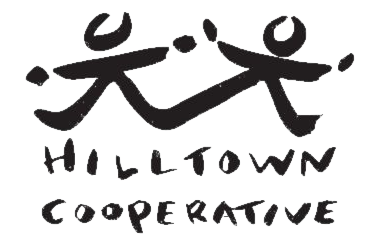HCCPS aspires to center justice, equity, diversity, and inclusion (JEDI) into our school’s policies, practices, and culture. We strive toward being a safe and equitable school for all current and future students, staff, and families of all identities related to race, ethnicity, gender, religion, sexuality, ability, neurotype, or other aspects of identity. Hilltown seeks to center JEDI in the culture, policies, practices, and curriculum of the school at all levels. With humility, we commit to continuously evolving as individuals and as a school by critically examining how societal power and privilege dynamics play out in our own community. We also commit to evaluating our progress with JEDI efforts and taking action to improve areas of need. Finally, we commit to courageously leaning into discomfort acknowledging that it is a necessary part of dismantling inequity.
Furthermore, we believe JEDI work should go beyond the promotion of “celebration of difference” or “tolerance” and needs to critically examine and intentionally address the effects of historic and current systemic racism and other forms of institutionalized oppression. Prioritizing JEDI at Hilltown allows our community to meet our stated mission by working toward ensuring that students across identities and life experiences have access to what they need to succeed. Part of this work includes collectively creating an environment and culture where all students, families, faculty, and staff members from all backgrounds and abilities feel a sense of belonging and feel welcomed, heard, and valued in a responsive school community. By committing to these values and practices, Hilltown is better equipped to serve all of our community and to better ensure that all students can thrive.
adopted March 2024
Definitions
Justice
Process of dismantling barriers to resources and opportunities in society so that all individuals & communities can live a full & dignified life. These barriers are experienced disproportionately by marginalized people, who experience racism, classism, sexism, ableism, etc. Justice is action oriented towards change, requires working through discomfort, and is not simply awareness-raising work.
Equity
Whereas equality means providing the same to all, equity means allocating resources to ensure everyone has access to the same opportunities. Equity recognizes that advantages and barriers—the ‘isms’—exist. Inequities can be rectified by providing adequate resources to those who experience more barriers and disadvantages.
Equity provides adequate resources to those who experience more barriers and disadvantages by recognizing that we do not all start from the same place and must acknowledge and make adjustments to imbalances.
Diversity
The wide variety of shared and different personal and group characteristics among human beings. Diversity also stands for the practice of including people from a range of different social and ethnic backgrounds and different genders, sexual orientations, abilities, etc.
The differences between us are based on whether we experience systemic advantages or encounter systemic barriers to opportunities. The concept of diversity includes acceptance and respect of individual differences.
Inclusion
The aim of inclusion is to embrace all people irrespective of race, gender, disability, medical or other need. It is about giving equitable access and opportunities and getting rid of discrimination and intolerance.
Fostering a sense of belonging by centering, valuing, & amplifying the voices, perspectives and approaches of those who experience more barriers based on their identities. Authentically bringing traditionally excluded individuals and/or groups into processes, activities, and decision/policy making in a way that shares power.
Inclusion promotes broad engagement, shared participation, and advances authentic sense of belonging through safe, positive, and nurturing environments. Inclusion is key to eliminating systemic inequality.
(Adapted from JEDI Collaborative)
